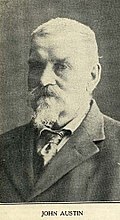Application of theory of positivism to law.
Law consists simply of the enforceable commands of government. It does not depend for its validity on any other criteria, and there are no religious or normative values by which it can be deemed invalid.
Source:
David Miller et al., eds, The Blackwell Encyclopaedia of Political Thought (Oxford, 1987)
Etymology
The term positivism is derived from Latin ponere, positum, meaning “to put”. “Positive law” is that which is man-made, i.e., defined formally.[2][citation needed]
Legal validity and the sources of law
In the positivist opinion, the source of a law is the establishment of that law by some legal authority which is recognised socially. The merits of a law are a separate issue: it may be a ‘bad law’ by some standard, but if it was added to the system by a legitimate authority, it is still a law.
The Stanford Encyclopedia of Philosophy summarises the distinction between merit and source like so: “The fact that a policy would be just, wise, efficient, or prudent is never sufficient reason for thinking that it is actually the law, and the fact that it is unjust, unwise, inefficient or imprudent is never sufficient reason for doubting it. According to positivism, law is a matter of what has been posited (ordered, decided, practiced, tolerated, etc.); as we might say in a more modern idiom, positivism is the view that law is a social construction.”[3]
Legal positivism does not claim that the laws so identified should be obeyed, or that necessarily there is value in having clear, identifiable rules (although some positivists may also make these claims). Indeed, the laws of a legal system may be quite unjust, and the state may be quite illegitimate; as a result, there may be no obligation to obey them. Moreover, the fact that a law has been identified by a court as valid does not provide any guidance as to whether the court should apply it in a particular case. As John Gardner has said, legal positivism is “normatively inert”; it is a theory of law, not a theory of legal practice, adjudication, or political obligation. Legal positivists believe that intellectual clarity is best achieved by leaving these questions for separate investigation.
Legal positivism and legal realism
Legal positivism is distinct from legal realism. The differences are both analytically and normatively important. Both systems consider that law is a human construct. Unlike the American legal realists, positivists believe that in many instances, the law provides reasonably determinate guidance to its subjects and to judges, at least in trial courts.
Niklas Luhmann asserts “We can reduce … positive law to a formula, that law is not only posited (that is, selected) through decision, but also is valid by the power of decision (thus contingent and changeable).”[4] However, positivists do not assert that law is made valid by anyone’s decision. In Hart’s opinion, the validity of law is a matter of the customary and collective practices of the courts. As for the moral validity of law, both positivists and realists maintain that this is a matter of moral principles. “The power of decision” has no essential role in either, since individual decision rarely suffices to create a social practice of recognition, and it would be implausible to suppose that moral principles are made so by anyone’s decision.[3][5][citation needed]
History
Antecedents of legal positivism
The main antecedent of legal positivism is Empiricism, the thinkers of which range back as far as Sextus Empiricus, Thomas Hobbes, John Locke, George Berkeley, David Hume, and Auguste Comte. The main idea of empiricism is the claim that all knowledge of fact must be validated by sense experience or be inferred from propositions derived unambiguously from sense data. Further, empiricism is in opposition to metaphysics; for instance, Hume rejected metaphysics as mere speculation beyond what can be learnt from sense experience.[6] The teachings of the empiricists preceded systemization of a positivist method for problems of comprehension and analysis, which was later represented by legal positivism.[7]
Logical positivists such as Rudolf Carnap and A. J. Ayer suggested another important tenet of legal positivism: namely, that propositions and the use of words must be examined in order to understand reality.[7] A sentence has literal significance if, and only if, it expresses something which is either tautologous or empirically verifiable.[7]
Legal positivism
Methodology
With the empiricist and logical positivist theoretical influences borne in mind, the essence of legal positivism as a descriptive investigation of particular legal orders is revealed, which, as Peter Curzon wrote, “utilises in its investigations the inductive method (i.e., proceeding from observation of particular facts to generalisations concerning all such facts)”.[7] During these investigations, matters of ethics, social policies and morality are eschewed; as Julius Stone wrote, it is concerned primarily with “an analysis of legal terms, and an enquiry into the logical interrelations of legal propositions”. Further, law and its authority is considered as source-based; i.e., the validity of a legal norm depends not on the moral value attached thereto, but from the sources determined by a social community’s rules and conventions.[7] The source-based conception of law is reminiscent of the logical positivist Rudolf Carnap, who starkly rejected metaphysics on the basis that it attempts to interpret the nature of reality beyond the physical and experiential.
Thomas Hobbes and Leviathan
Thomas Hobbes, in his seminal work Leviathan, postulated the first detailed notion of law based on the notion of sovereign power. As Hampton writes, “law is understood [by Hobbes] to depend on the sovereign’s will. No matter what a law’s content, no matter how unjust it seems, if it has been commanded by the sovereign, then and only then is it law.”[8] There is, however, debate surrounding Hobbes’s status as a legal positivist.[8][9][10]
Jeremy Bentham
The English jurist and philosopher Jeremy Bentham is arguably the greatest historical British legal positivist. In An Introduction to the Principles of Morals and Legislation, Bentham developed a theory of law as the expressed will of a sovereign. Bentham made a distinction between the following types of people:
- Expositors – those who explained what the law in practice was;
- Censors – those who criticised the law in practice and compared it to their notions of what it ought to be.
The philosophy of law, considered strictly, was to explain the real laws of the expositors, rather than the criticisms of the censors.
Bentham was also noted for terming natural law “nonsense upon stilts”.
John Austin’s command theory

John Austin.
John Austin partly emulated Bentham by writing The Province of jurisprudence Determined.[11] However, Austin differed from Bentham in a number of ways, for example, by endorsing the common law.
Differences aside, Austin embraced Hobbes’s and Bentham’s conception of law as a sovereign command, whose authority is recognised by most members of a society; the authority of which is enforced by the use of sanctions, but which is not bound by any human superior. The criterion for validity of a legal rule in such a society is that it has the warrant of the sovereign and will be enforced by the sovereign power and its agents.
The three main tenets of Austin’s command theory are:
- laws are commands issued by the uncommanded commander, i.e. the sovereign;
- such commands are enforced by sanctions;
- a sovereign is one who is obeyed by the majority.
Austin considered law to be commands from a sovereign that are enforced by a threat of sanction. In determining ‘a sovereign’, Austin recognised it is one whom society obeys habitually. This sovereign can be a single person or a collective sovereign such as Parliament, with a number of individuals, with each having various authoritative powers. Austin’s theory is also somewhat brief in his explanations of Constitutions, International Law, non-sanctioned rules, or law that gives rights. Insofar as non-sanctioned rules and laws that allow persons to do things, such as contract law, Austin said that failure to obey the rules does result in sanctions; however, such sanctions are in the form of “the sanction of nullity”.
Hans Kelsen and Germanic positivism

Bust of Hans Kelsen in the Arkadenhof, University of Vienna.
The British legal positivism hitherto mentioned was founded on empiricism; by contrast, Germanic legal positivism was founded on the transcendental idealism of the German philosopher Immanuel Kant. Whereas British legal positivists regard law as distinct from morals, their Germanic counterparts regard law as separate from both fact and morals. The most famous proponent of Germanic legal positivism is Hans Kelsen, whose thesis of legal positivism is explained by Suri Ratnapala, who writes:
The key elements of Kelsen’s theory are these. Facts consist of things and events in the physical world. Facts are about what there is. When we wish to know what caused a fact we look for another fact. A stone thrown in the air comes down because of the force of Earth’s gravity. There are seasons because the Earth’s axis is tilted at 23.5 degrees. A norm, unlike a fact, is not about what there is but is about what ought to be done or not done. Whereas facts exist in the physical world, norms exist in the world of ideas. Facts are caused by other facts. Norms are imputed by other norms. The requirement that a person who commits theft ought to be punished is a norm. It does not cease being a norm because the thief is not punished. (He may not get caught.) The norm that the thief ought to be punished exists because another norm says so. Not all norms are laws. There are also moral norms. Legal norms are coercive; moral norms are not.[12]
From this framework, Kelsen opined that the regression of validated norms cannot go on infinitely and must arrive at a first cause, which he called a Grundnorm (basic norm). The legal system is therefore a system of legal norms connected to each other by their common origin, like the branches and leaves of a tree.
For Kelsen, “sovereignty” was an arbitrary concept: “We can derive from the concept of sovereignty nothing else other than what we have purposely put into its definition.”[citation needed]
Kelsen attracted disciples among scholars of public law worldwide. These disciples developed “schools” of thought to extend his theories, such as the Vienna School in Austria and the Brno School in Czechoslovakia. In English-speaking countries, H. L. A. Hart and Joseph Raz are perhaps the best-known authors who were influenced by Kelsen, though both schools differed from Kelsen’s theories in several respects

Thanks for every other informative site. The place else may just I get that kind of information written in such a perfect means? I have a challenge that I’m just now operating on, and I have been at the look out for such information.
Thank you for another excellent article. Where else may anybody get that type of info in such an ideal manner of writing? I have a presentation next week, and I am on the look for such information.